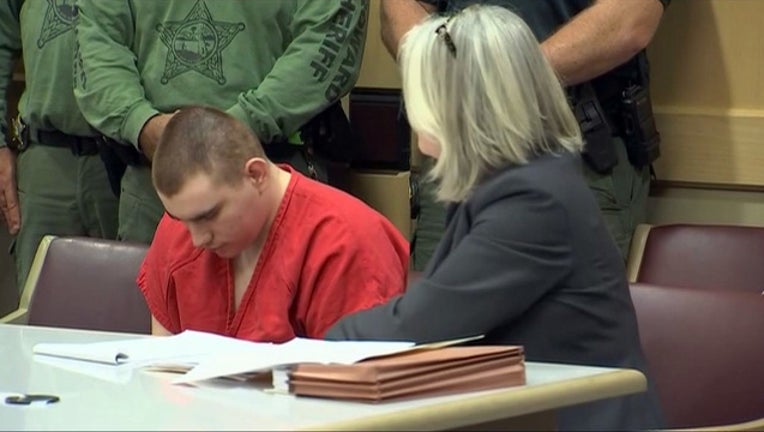Judge to review school-shooting suspect's 12-hour interview

MIAMI (AP) - A judge will review a 12-hour video interrogation of Florida school shooting suspect Nikolas Cruz people before deciding which parts should be publicly released.
Conducted shortly after the Valentine's Day massacre, it includes a confession to the shooting that killed 17 at Marjory Stone man Douglas High School, prosecutors told Broward Circuit Judge Elizabeth Scherer at a hearing Friday. Cruz's lawyers say those portions should not be released and other segments might inflame a community already traumatized by the crime and jeopardize Cruz's right to a fair trial.
Defense attorneys also expressed concern that other parts of the statement get into Cruz's mental state at the time of the shooting, which might become an issue if an insanity defense is pursued at trial and jurors have already seen it. Florida law in general requires public release of evidence in criminal cases once prosecutors turn it over to the defense, although parts can be exempted.
"I don't know that will be the defense. We haven't even discussed that yet," said Cruz attorney David Frankel. "The court can keep certain amounts of it confidential in the interests of justice."
Attorneys for The Associated Press and other media organizations agreed that some portions could be blocked from release, but argued that as much as possible should be made public. They noted that cellphone videos Cruz made before the shooting have been made public, and they depict him describing in precise detail what he planned to do, how many people he hoped to kill and why he felt compelled to become a school shooter -- almost the same as a confession.
"A lot of information has been released in this case already," said media attorney Dana McElroy. "I'm sure we'll go through this a number of times in this case."
Scherer said she would review the statement, which covers 200 pages in a transcript, and then decide what should be released.
"That would be the first step," the judge said.
Cruz, 19, faces 17 counts of first-degree murder and 17 counts of attempted murder in the shooting. His lawyers say he will plead guilty in exchange for a life prison sentence, but prosecutors have refused to waive the death penalty.
Cruz said nothing in court and sat at the defense table in chains in a red prison outfit with his head bowed. One difference was that he had a buzz haircut and appeared heavier than in previous hearings.
Also Friday, two sheriffs on the commission investigating the massacre said it is unrealistic to believe there will be police officers or armed guards assigned to all the state's schools this fall.
A law passed by the Florida Legislature after the shooting requires that each public elementary, middle and high school have at least one armed guard. That could be a police officer, a trained staff member or a trained civilian.
Polk County Sheriff Grady Judd told the Marjory Stoneman Douglas Safety Commission that he doesn't have enough qualified applicants to hire the 100 additional deputies he would need. Judd said his county is instead hiring trained civilians, called "guardians," for the positions. Most Florida districts chose not to do that.
"The guardian program is, for me, light from heaven" to meet the August deadline, Judd said.
Pinellas County Sheriff Bob Gualtieri, the commission's chairman, said school districts are struggling to pay for their share of the hiring and equipping.
The state Department of Education said there will be some leniency in enforcement as districts work toward filling all the positions.
Broward Sheriff's Maj. Nichole Anderson told the panel that her office believes it would be better if the county school district formed its own police department. The neighboring counties of Miami-Dade and Palm Beach have school district police departments and Anderson said that system works well.
She said the advantage is that having a unified school police department would create a uniform policy and funding. She said the sheriff's office and several city police departments currently provide school officers and each agency has different procedures. They also have a mixture of funding sources.
Broward Deputy Scot Peterson was assigned to Stoneman Douglas when the massacre happened. He retired after being criticized for not rushing into the building where the shootings happened. He has insisted that he did not know the shooting was coming from inside the building and that he could not have stopped the suspect.

